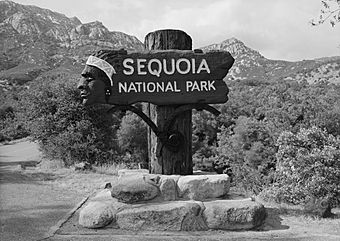Ash Mountain Entrance Sign facts for kids
Quick facts for kids |
|
|
Ash Mountain Entrance Sign
|
|
 |
|
| Nearest city | Three Rivers, California |
|---|---|
| Built | 1935 |
| Architect | George Muno, Harold Fowler |
| NRHP reference No. | 78000367 |
| Added to NRHP | April 27, 1978 |
The Ash Mountain Entrance Sign is a special landmark at Sequoia National Park in California. It was built in 1935. This unique sign was crafted by skilled workers from the Civilian Conservation Corps. It features a carved face of a Native American. The sign is made from large pieces of sequoia wood. Strong iron brackets hold it all together.
Contents
Building the Park Entrance Sign
How the Idea Started
The idea for the sign began in 1931. Merel S. Sager, an architect for the National Park Service, first suggested it. He designed a small sign made of logs for the Ash Mountain entrance.
Designing a Bigger Sign
Later, in 1935, a park landscape architect named Harold G. Fowler created a much larger design. He found a talented woodworker named George W. Muno. George was a worker with the Civilian Conservation Corps (CCC). Together, they chose a piece of fallen sequoia wood. This wood came from the famous Giant Forest in the park.
Carving the Face
Harold Fowler drew the outline of a face on the wood. He used blue chalk and an Indian Head nickel coin as a guide. George Muno then spent several months carving the wood. The sign was put together and set up during the winter of 1935-1936.
Moving the Sign
In 1964, the sign was moved. This was done to make space for a new entrance station at the park.
What the Sign Looks Like
The Ash Mountain Entrance Sign is very impressive. It stands on a large sequoia log. This log is about four feet wide. The log rises from a two-level stone platform.
Details of the Sign Panel
The main sign panel is ten feet wide. It is four feet tall and one foot thick. The carved face on the sign is thought to represent Sequoyah. He was a famous leader of the Cherokee tribe. However, the Cherokee tribe never lived in California.
Colors and Changes
When the sign was first built, it had no paint. It looked like natural wood. In the 1950s, it was painted to look as it does today. Originally, there was also a matching log pillar. This pillar stood on the other side of the road. But this pillar was removed when the sign was moved in 1964.
Images for kids
 | Bayard Rustin |
 | Jeannette Carter |
 | Jeremiah A. Brown |




